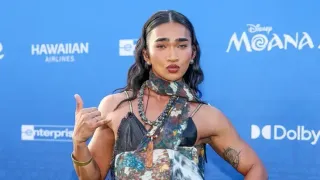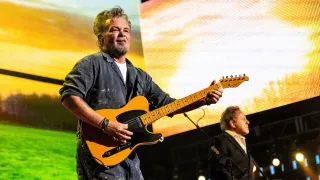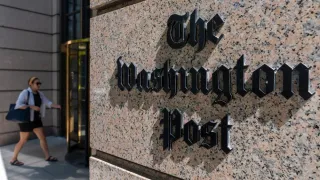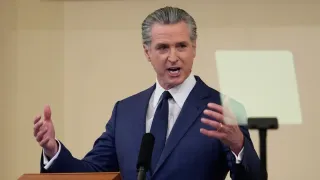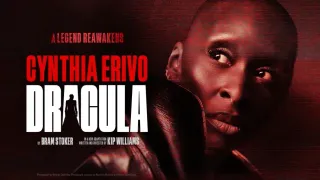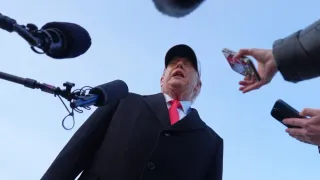May 31, 2022
'Fire Island' Fun: Andrew Ahn & Joel Kim Booster on Their Idyllic Summer Getaway
Brian Bromberger READ TIME: 8 MIN.
Summer is here, and the ideal LGBTQ film to satisfy any hot weather lethargy or romantic yearnings has arrived in "Fire Island," a multicultural gay rom-com set in the iconic enclave, The Pines –often referred to as America's first lavender town– with a modern updating of Jane Austen's classic "Pride and Prejudice."
It premieres on Hulu June 3 just in time for Pride, providing cause for celebration, as this is a rare queer mainstream entertainment from a major Hollywood studio, Disney's Searchlight Pictures (they also own Hulu), with an all-LGBTQ main cast.
Every summer, Noah (Joel Kim Booster), who also does the voice-over narration, his BFF Howie (Bowen Yang) and their friends head to Fire Island for a week of non-stop partying and hooking up with hot men.
They stay with their lesbian friend Erin (comedian Margaret Cho), the irreverent den mother, who owns a house, but announces that due to financial trouble she will have to sell her vacation home, likely making this their last summer together.
The non-monogamous insecure sarcastic Noah resolves to help Howie find the man of his dreams, promising he will remain abstinent until he succeeds (yeah, right). Howie meets Charlie, a charming doctor (James Scully) and they like each other, but Charlie's upscale social circle look down on Noah, Howie, and company. The handsome, laconic lawyer Will (Conrad Ricamora) seems particularly condescending, but Noah is both infuriated and intrigued by him.
The week continues with underwear parties, dancing competitions, karaoke performances, alcohol, drugs and debauchery, as the characters fight and scheme over potential romantic entanglements. Will there be fairy tale endings?
The film soothes like imbibing a fizzy cocktail on a blistering hot afternoon. It's a raucous joyful vacation comedy with plenty of raunchy bawdy romps in backrooms and in the Meat Rack, plus witty at-times biting repartee with whip-smart banter references, and a likeable ensemble cast.
Classy take on classism
"Fire Island" was shot largely on location at Fire Island (32 miles off the coast of Long Island, New York) and viewers will feel like they are there, as the film captures the sun-drenched energy of this shoreside getaway and its breezy party atmosphere.
Historically, the resort was a refuge for gay men to build camaraderie with each other, a safe hideout from a disapproving society, where unencumbered they could be comfortable being themselves. Fire Island has never looked better with its golden lighting, plus an awesome sunset scene.
The Bay Area Reporter interviewed Booster, who is also the screenwriter, and director Andrew Ahn at the Fairmount Hotel, when a screening was held in San Francisco at the CGV Cinema on May 11.
Fire Island is Booster's favorite place to be. "You feel so free, can carve out your own space and find the people you vibe with."
In writing the script, Booster transferred many of his own experiences into the story, basing the close relationship between Noah and Howie on his real-life friendship with Yang, the first close gay friend he had who was also Asian. He accompanies Booster to Fire Island every year. Booster also wanted to show them as different individuals with different perspectives.
The film was not meant to be a largely Asian-American main cast, according to Booster.
"I didn't even envision Conrad's character as Asian-American in the beginning," he said. "But Conrad read, and his chemistry with me was amazing. And when Margaret Cho asks to be part of your movie, you say yes."
For Ahn, "I just wanted to show the depth of talent in the community. The big reason I wanted to direct this film was to focus on queer Asian-American friendship and joy."
"I received the script a year into the pandemic and I hadn't seen my friends, hung out, gone out drinking and dancing with them for a long time, so to be able to show that in a movie so people could see this and value it, was rewarding for me."
Jane Austin's "Pride and Prejudice" was always Booster's beach read, and struck him as being prescient about what Bowen and he were experiencing. He based Noah on Lizzie Bennett, Howie on Jane Bennett, Charlie on Charles Bingley, and Will on Mr. Darcy.
"Austen is really adept at depicting people being really awful to each other without actually being awful to each other, an attitude gay men have really perfected."
Booster took Austen's canny observations about snobbish class lines and in "Fire Island" slyly relates them into how gay men can oppress each other ("no fats, no femmes, no Asians").
"A part of Fire Island is oppressively white and inherently classist," he said. "Once you're here, it can feel very alienating if you're a person of color or you're of a different body type. It's funny to see how we as gay men discriminate and divide ourselves even further. Fire Island has always been a haven for privileged gay men, but hopefully going forward it can be a refuge for all people of our community."
Disney Double-Take
Booster, a few months ago, had released a public statement about it "being really tough," about making a significant queer film for Disney, after their publicized actions surrounding the "Don't Say Gay" bill in Florida. Initially Disney had donated money to Florida Gov. Ron DeSantis and all the other politicians behind this law, which prohibits conversations around sexual orientation and gender identity in schools.
"We live in a society and we have to make concessions in order to get things done," said Booster. "For me, I'm grateful this movie is going to be seen by so many people, and hopefully will help queer kids who see themselves in these characters to feel good and affirmed. I'm sort of waffling here, and it's something I'm not happy about."
Disney was going to stay silent about the bill, but there was so much public controversy, and a walk-out by Disney employees, they eventually condemned it and affirmed their commitment to their queer employees and to telling LGBTQ+ stories. Because of Disney's turn-around on the issue, Booster feels much better about their support.
Ahn observed, "An art form like film is so expensive to make, and to pay the cast and crew a livable wage, we need a lot of access to financing. You sometimes have to enter into these more corporate ways of financing art. It's really about shifting resources."
Ahn is also pleased that with the advent of streaming services there is more accessibility and avenues for queer filmmakers to create their art.
"Fire Island" producer Brooke Posch sees the film promoting family as choosing people around you "who support who you truly are, so you can be comfortable in your skin."
Booster comes from an evangelical Christian family, so chosen family has been a lifesaver for him.
"There is a line in the movie that Bowen says, 'You find the friend who fills in the gaps,' " said Booster. "I don't think my biological family will see this movie. I love my family, and they love me. They are very proud that I'm able to sustain myself in this career, but they are very uncurious about its specifics. I love this chosen family who fill in my gaps with the way I was raised."
Booster answers some of the criticism the film has received about perpetuating stereotypes that gay men are only interested in sex and drugs ("Do I smell some bottoms here?"). For a film razzing gay obsession with looks, there are loads of hunky men with six-pack abs.
"I embody a lot of stereotypes, and I'm not ashamed to say that," said Booster. "I love sex and to party, but I also read and I'm incredibly intelligent. With each of these characters, you are getting a lot of different facets of their personalities. Yes, some of that may be stereotypical to how the media has portrayed gay men in the past, but there are also layers beyond those characters."
For both Booster and Ahn, community and friendship are central themes of "Fire Island." Booster asserted, "We have to be there for one another, since the world does not provide us with the same support heterosexuals find. We have to ignore our more toxic impulses and lean on each other."
Ahn added, "I want people to recognize the importance of their relationships. I think so much of the work aimed at our community is about trauma and homophobia. I want people to walk away from 'Fire Island' feeling joyful. I think for queer people today, our friendships are more important than our romantic relationships in our lives. I love that in our film the final moments are not about which characters are kissing, but the touching, long-lasting bond between Noah and Howie."
'Fire island' on Hulu: www.Hulu.com
Help keep the Bay Area Reporter going in these tough times. To support local, independent, LGBTQ journalism, consider becoming a BAR member.
